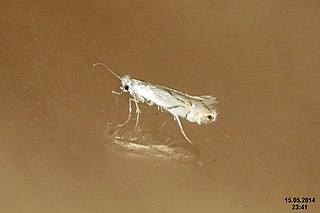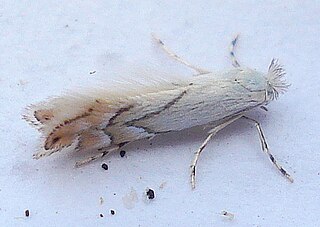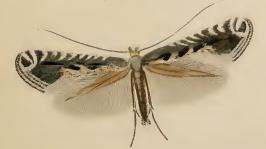
Coleophora lutipennella is a moth of the family Coleophoridae. It is found in most of Europe, except the Mediterranean islands.

The leaf blotch miner moth is a moth of the family Gracillariidae. It is found in Europe, including Turkey.

Parornix anglicella is a moth of the family Gracillariidae found in Asia and Europe. It was described in 1850, by the English entomologist Henry Tibbats Stainton, from a specimen from Lewisham, Kent.

Lampronia corticella, the raspberry moth, is a moth of the family Prodoxidae. The species was first described by Carl Linnaeus in his 1758 10th edition of Systema Naturae. It is found in most of Europe, except Iceland, the Iberian Peninsula and the Balkan Peninsula. It is an introduced species in North America, where it was first detected in New Brunswick, Canada, in 1936.

Grapholita jungiella is a moth of the family Tortricidae. It is found in most of Europe, east to the Near East and the eastern part of the Palearctic realm.

Leucoptera laburnella is a moth in the family Lyonetiidae. It is found in most of Europe, except the European part of Russia and the southern part of the Balkan Peninsula. It is also found in North America.

Phyllonorycter coryli, or nut leaf blister moth, is a moth of the family Gracillariidae. It is found most of Europe, except the Balkan Peninsula.

Phyllonorycter roboris is a moth of the family Gracillariidae. It is found in all of Europe.

Phyllonorycter harrisella is a moth of the family Gracillariidae. It is found in all of Europe, except the Balkan Peninsula and the Mediterranean islands.

Incurvaria praelatella is a moth of the family Incurvariidae. It is found in all of Europe, except the Iberian Peninsula.

Phyllonorycter hilarella is a moth of the family Gracillariidae. It is found in all of Europe, except the Balkan Peninsula and the Mediterranean Islands.

The European oak leaf-miner or Zeller's midget is a moth of the family Gracillariidae. It is found in Europe south of the line running from Ireland, through Great Britain, Denmark to Ukraine. It is also found in Macaronesia. It is an introduced species in New Zealand and Australia.

Phyllonorycter nigrescentella is a moth of the family Gracillariidae. It is known from all of Europe except the Balkan Peninsula.

Phyllonorycter quercifoliella is a moth of the family Gracillariidae. It is known from all of Europe, except for the Mediterranean islands.

Phyllonorycter rajella is a moth of the family Gracillariidae. It is known from all of Europe, except the Iberian Peninsula and Greece.

Phyllonorycter salictella is a moth of the family Gracillariidae. It is known from all of Europe, east to Russia and Japan.

Phyllocnistis unipunctella is a moth of the family Gracillariidae. It is known from all of Europe.

Parornix scoticella is a moth of the family Gracillariidae. It is known from all of Europe.

Parornix torquillella is a moth of the family Gracillariidae found in Europe. The larvae mine the leaves of Prunus species, such as blackthorn. It was described by the German entomologist Philipp Christoph Zeller in 1850, from specimens found in Florence, Leghorn and Pisa.

Bucculatrix ulmella is a moth of the family Bucculatricidae. It is found in most of Europe, except the Iberian Peninsula, Slovenia and Bulgaria. It was first described in 1848 by Philipp Christoph Zeller.




















